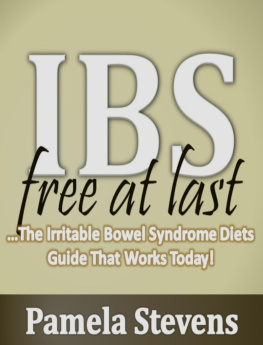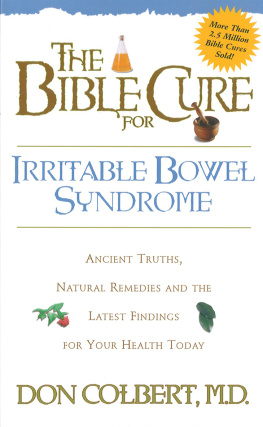Making Sense of IBS
A Johns Hopkins Press Health Book
Making Sense of IBS
A Physician Answers Your Questions about Irritable Bowel Syndrome
SECOND EDITION
Brian E. Lacy, Ph.D., M.D.

Note to the reader: This book is not meant to substitute for medical care, and treatment should not be based solely on its contents. Instead, treatment must be developed in a dialogue between you and your doctor. It is especially important to discuss the use of any medications with your doctor.
2006, 2013 Johns Hopkins University Press
All rights reserved. Published 2013
Printed in the United States of America on acid-free paper
9 8 7 6 5 4 3 2
Johns Hopkins University Press
2715 North Charles Street
Baltimore, Maryland 21218-4363
www.press.jhu.edu
Library of Congress Cataloging-in-Publication Data
Lacy, Brian E.
Making sense of IBS : a physician answers your questions about irritable bowel syndrome / Brian E. Lacy, Ph.D., M.D. Second edition.
pages cm. (A Johns Hopkins Press health book)
Includes bibliographical references and index.
ISBN-13: 978-1-4214-1115-6 (pbk. : alk. paper)
ISBN-10: 1-4214-1115-6 (pbk. : alk. paper)
ISBN-13: 978-1-4214-1116-3 (electronic)
ISBN-10: 1-4214-1116-4 (electronic)
1. Irritable colon. I. Title. II. Title: Making sense of irritable bowel syndrome.
RC862.I77L33 2013
616.3'42dc23 2013006074
A catalog record for this book is available from the British Library.
All illustrations except are by Jacqueline Schaffer.
Special discounts are available for bulk purchases of this book. For more information, please contact Special Sales at 410-516-6936 or .
Johns Hopkins University Press uses environmentally friendly book materials, including recycled text paper that is composed of at least 30 percent post-consumer waste, whenever possible.
Preface
If youve picked up this book, then it is quite likely that you or a friend, a coworker, or someone in your family has irritable bowel syndrome (IBS). I can safely make that statement because 1 in 6 to 1 in 7 adult Americans suffers from this problem. Although the condition is quite common, people who have IBS have often found it difficult to get help for their symptoms or answers to their questions. Fortunately, over the past 10 years, significant advances have been made in our understanding of IBS. We now have a much clearer picture of why IBS develops, and we also better understand the very complex interactions that occur between the brain and the gut in patients who have IBS. In addition, researchers, scientists, and physicians have made significant contributions to our ability to manage the multiple symptoms of this often frustrating disorder.
Because education of patients and health care providers about IBS has been limited, I wanted to write this book to share this wealth of new information with more people. The book has several goals:
to convey what we currently understand about IBS
to clear up the many misconceptions and misperceptions that surround IBS
to help you recognize the symptoms of IBS
to describe tests that may be used during the evaluation of IBS symptoms
to discuss the many treatment options available for the diverse symptoms of IBS
to provide information that will allow people who have IBS to better understand their symptoms, institute changes, and improve their quality of life.
To accomplish these goals, I have divided this book into four parts. discusses children who have IBS and the future for IBS treatments and education. Terms used in the book are defined in a glossary at the back, and at the front of the book is a list of abbreviations. There is also a short appendix about the design and importance of clinical studies.
I hope that this book will answer your many questions about IBS and allow you to make sense of this common disorder.
Acknowledgments
The process of writing, editing, and publishing a book is a significant undertaking that represents the collective efforts of many people. Unfortunately, and unfairly, the cover of a book lists only the authors name and does not credit the many others so intimately involved in this lengthy process. Although it is not possible to properly thank everyone who contributed to this project, I would like to acknowledge some of them.
First, I want to thank all of the patients who have IBS whom I have seen over the past fifteen years. I appreciate their willingness to describe their symptoms and share how IBS affects their lives. I hope that this book will provide them with new ideas and information that will enable them to better understand this complex disorder and ameliorate their symptoms.
Thanks also go to Executive Editor Jacqueline Wehmueller and to Sara Cleary, both of the Johns Hopkins University Press, for their cogent thoughts, continued encouragement, and tireless efforts in editing and revising the manuscript. In addition, I owe great thanks to all of my friends and colleagues at Dartmouth for their wonderful suggestions, advice, and support.
Finally, I dedicate this book to the memory of my father, who taught me to be patient and understanding, and to Elaine, for her unwavering patience, support, and selflessness.
Abbreviations
Abbreviations will usually be defined where they first appear in the text. This list is provided for convenient reference.
ANS | autonomic nervous system |
CBC | complete blood count |
CBT | cognitive behavioral therapy |
CFS | chronic fatigue syndrome |
CMV | cytomegalovirus |
CNS | central nervous system |
CPP | chronic pelvic pain |
CRF | corticotropin releasing factor |
CRP | C-reactive protein |
CT | computed tomography |
DNA | deoxyribonucleic acid |
EGD | esophagogastroduodenoscopy |
ENS | enteric nervous system |
ESR | erythrocyte sedimentation rate |
FDA | Food and Drug Administration |
5-HT | 5-hydroxytryptamine, also called serotonin |
GERD | gastroesophageal reflux disease |
GI | gastrointestinal |
gm | gram(s) |
Hct | hematocrit |
Hgb | hemoglobin |
HIV | human immunodeficiency virus |
IBD | inflammatory bowel disease |
IC | interstitial cystitis |
LES | lower esophageal sphincter |
LFTs | liver function tests |
mg | milligram(s) |
ml | milliliter(s) |
MRI | magnetic resonance imaging |
MSG | monosodium glutamate |
OAB | overactive bladder |
O&P | ova and parasites |
OTC | over-the-counter |
PEG | polyethylene glycol |
Next page









